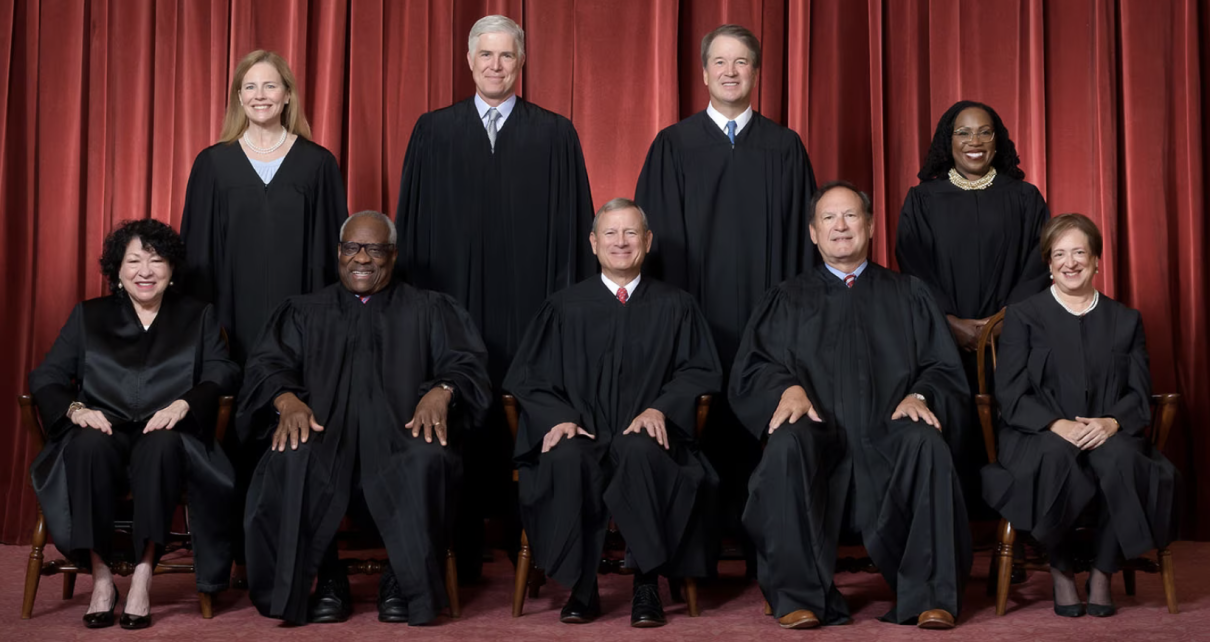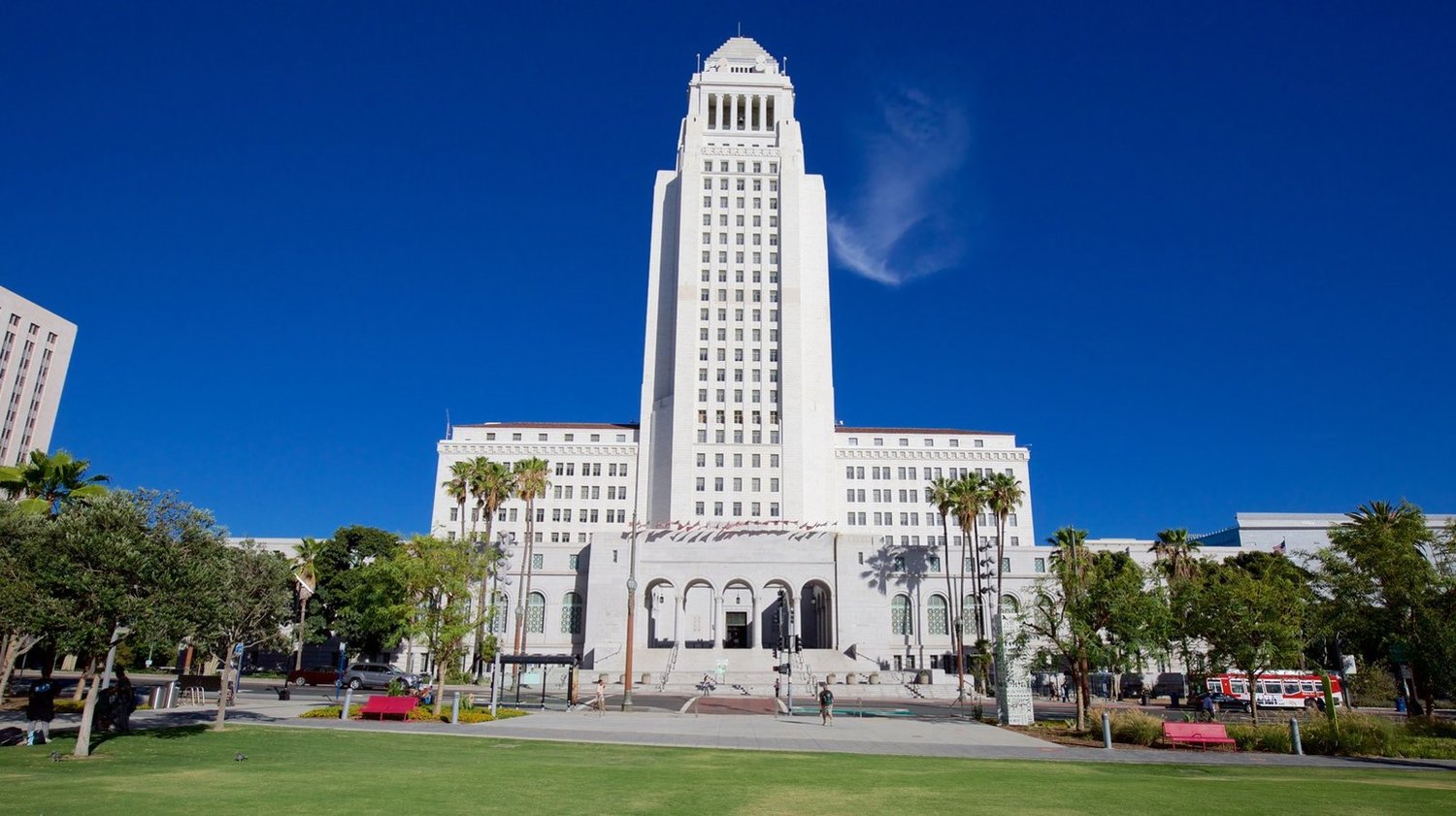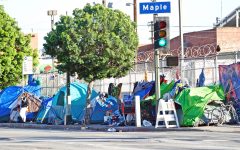
Justices of The U.S. Supreme Court. (Photo: supreme court.gov)
The Courts and Homelessness: City Anti-Camping Ordinance Goes Before the Supremes
It appears that state and local officials may soon be empowered to do something about the problem
By Thomas Buckley, April 22, 2024 3:57 pm
When discussing homelessness, California state and local officials often point to a federal court ruling they say ties their hands completely when it comes to dealing with the problem.
But it appears, from the tenor of the oral arguments today in front of the United States Supreme Court on a homelessness case, that state and local officials may soon be empowered to do something about the problem.
Or, at the very least, they will lose their oft-repeated “the courts won’t let us do anything” excuse when it comes to not addressing the problem and thereby losing their political cover.
The case heard today is called City of Grants Pass v. Johnson – It involves an Oregon city appealing a Ninth Circuit (which covers basically the western states) Federal Circuit Court ruling that disallowed the city from enforcing its “anti-camping” ordinance.
In 2018, the same court, in a case called Martin v. Boise, ruled, in a nutshell, that if a city did not have a shelter spot for a homeless person they could not in effect criminalize the act, or “status” of being homeless on its own. The Grants Pass case is similar but involves civil actions (fines, etc.) as well.
SCOTUS Blog explains the Grants Pass case:
The question is one that the U.S. Court of Appeals for the 9th Circuit, based in San Francisco, has grappled with repeatedly in recent years. In Martin v. City of Boise, the court of appeals held that punishing homeless people for public camping would violate the Eighth Amendment’s ban on cruel and unusual punishment if they did not have access to shelter elsewhere. The court of appeals reasoned that, just as the city could not punish someone for their status – being homeless – it also could not punish them for conduct “that is an unavoidable consequence of being homeless.”
A few weeks after the 9th Circuit’s decision in Martin, three individuals who are involuntarily homeless went to federal court in Oregon to challenge a ban on public camping in Grants Pass, a southern Oregon city with just under 40,000 people.
The city came to the Supreme Court in August, asking the justices to weigh in. The 9th Circuit’s rulings, the city wrote, have created “a judicial roadblock preventing a comprehensive response to the growth of public encampments in the West.” Without the ability to act, the city wrote, such encampments have led to “crime, fires, the reemergence of medieval diseases, environmental harm, and record levels of drug overdoses and deaths on public streets.”
In other words, the city is asking the Supremes for permission to enforce its laws.
And many California officials have agreed with the stance. Sacramento County District Attorney Thien Ho filed an “amicus” (or supporting) brief with the court as the Globe reported in January, as did Rep. Kevin Kiley (R-Rocklin and several other California members of Congress.
“Homelessness in California is a crisis and a tragedy. But today can be a new day. I filed a brief asking the Supreme Court to give our communities back the ability to regulate homeless encampments in a common sense way,” Kiley said. “The Court appears poised to that by reversing misguided 9th Circuit decisions that are out-of-step with the rest of the country. This case is an opportunity to reclaim our public spaces, restore order, reduce crime, protect public health, and get homeless individuals the assistance they need.”
The liberal justices today took the discussion to such an absurd extreme one must question what is is in the water cooler at the Supreme Court. Justice Elena Kagan wondered if, since the city could (somehow) ban sleeping could it not ban another “biological necessity” like “breathing” while Justice Ketanji Brown Jackson wondered if a city “decided it was going to execute homeless people” because they were homeless.
That being said, other more rational justices seemed to be siding with Grants Pass’ argument that it be allowed to enforce its laws and that “homelessness” cannot be considered a protected “status.”
One of the main points repeatedly discussed on Monday was the difference between status and conduct. According to a Supreme Court ruling in the 1962 case Robinson v. California, it’s unconstitutional for a state to punish someone for being a drug addict, which is a status rather than an act, like committing a crime. While it can be illegal to do things like possess or buy drugs, the simple status of being a drug addict (or alcoholic, etc.) cannot be a crime.
The city’s attorney, Theane Evangelis, noted a simple fact created by the Ninth Circuit’s decision:
“These generally applicable laws prohibit specific conduct and are essential to public health and safety. The 9th Circuit tied cities’ hands by constitutionalizing the policy debate over how to address growing encampments,” Evangelis said. “[The 9th Circuit’s ruling] left cities with really no choice. Either keep building enough shelter that may or may not be adequate or suitable to someone’s preferences or be forced to give up all of your public spaces. That is what’s happened.”
The court is expected to hand down a ruling in early summer.
- Benefit Fraud Problems and Solutions - November 7, 2024
- A Little Exit Poll - November 5, 2024
- Tomorrow’s Headlines Today! - November 5, 2024




Hoping for the best outcome on this. So much so I’m almost afraid of “jinxing” it with blah-blah.
It’s a big one, and we wait….
“The liberal justices today took the discussion to such an absurd extreme one must question what is is in the water cooler at the Supreme Court. Justice Elena Kagan wondered if, since the city could (somehow) ban sleeping could it not ban another “biological necessity” like “breathing” while Justice Ketanji Brown Jackson wondered if a city “decided it was going to execute homeless people” because they were homeless.”
Liberal absurdity. The SCOTUS decision will be 6-3 in favor of Grants Pass, imo.
Agree with you, Raymond. Craziness and absurdity on full display.
Really hope you are right about the decision.
Regardless of the court’s ruling the underlying problem is drug addiction. No amount of “housing” will solve this problem. The only solution is mandatory detoxification for the addicts coupled with counseling and job training. The drug dealers need to be dealt with harshly. Build a federal prison in Eastern Nevada and incarcerate every dealer. Singapore has almost no drug problems. Dealing drugs in Singapore can bring a death penalty.
“Singapore has almost no drug problems. Dealing drugs in Singapore can bring a death penalty.”
This is true, Fed Up……because Singapore doesn’t just HAVE the death penalty law, Singapore ENFORCES the death penalty. Would California do that? Right now, California releases drug dealers from prison….more liberal craziness and absurdity.
Why do 335 million U.S. citizens allow nine unelected judges to make final decisions that affect the entire nation when most of them are partisan political hacks one of whom can’t even define what a woman is?